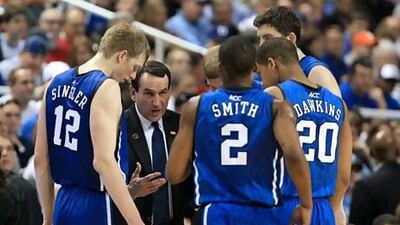Markets are volatile. Many pundits are saying we are heading towards a double-dip recession. The world economy is in a state of uncertainty. How can business leaders maintain a winning approach in the midst of this chaos? Managers can draw leadership lessons from Mike Krzyzewski, the legendary Duke and US Olympic basketball coach, whose team plays against the UAE national team on Friday in Dubai.
Krzyzewski, who also is an executive in residence for Duke's Fuqua School of Business, has referred to basketball as "organised chaos". In the face of that chaos, he builds stability and adaptive capacity by forging a sense of community. His players understand the team roles, standards and identity - helping them see how they should internally relate to and connect with each other.
Strategy, understanding the competition and strong technical talent are keys to success in any competitive sport. However, in basketball, when the momentum can shift at any moment, an intense uncertainty exists throughout the entire game. In this context, the team's abilities to adapt to constant change and operate in unstable environments are decisive factors for winning. The same holds true for business leaders in today's uncertain business environment. Here are some other lessons that can be gleaned from one of the most successful basketball coaches in the world, and a best-selling author on leadership.
Use symbols and images to create a frame of reference
Business leaders often invest heavily in developing a vision that addresses all of the environment's complexities. But often the concepts are wordy, and by the time they traverse from the executive suite into the rest of the organisation, they can become lost, mistranslated and ineffective.
A hallmark of Krzyzewski's leadership is his use of symbols and images to effectively communicate visions and ideas that stick. The right image can be a powerful tool for conveying complex ideas.
Two images that he uses are the fist and the wheel.
To create an understanding of team identity, Krzyzewski uses the symbol of the five fingers coming together to form a fist. The symbol simply, but effectively, describes the unique strengths each individual brings to the game and the incredible power that results when they come together as a team.
To illustrate the structure of the organisation, he uses the image of the wheel. Traditionally, the spokes connect only to the centre (in this case the coach) of the wheel. In Krzyzewski's wheel, the spokes also connect to each other, resulting in greater stability so that even in the absence of the centre or a missing spoke, the wheel remains intact. His organisation has a higher degree of stability, mutual awareness and support because its members understand that their community is defined as much by the collective strengths and connectivity of its members as it is by the leader.
Provide focus and priorities
Even with a clear vision and stellar strategies, organisations can remain overwhelmed by the amount of work required to achieve the end goal. Without focus, members can be paralysed into inactivity or mobilised into a host of actions that generate little return.
Although the Duke team's endgame is winning the national championship, in every practice the focus is solely on the next game. This is regardless of the opponent. Players are expected to bring their best, and to treat each game as if it were the championship game. As the season progresses and the number of games grow, the team builds up the discipline, mentality and capacity to adapt to any situation.
Help members understand where they fit into the big picture
In a dynamic business environment, decisions often do not have time to go up and down a chain of command. Members need to be able to act in the moment in a way that is synchronous with the other parts of the organisation and in support of each other.
A key way that Krzyzewski creates an adaptive communal organisation is by providing clarity around players' roles and reaffirming each individual's importance to the team. A few years ago, when Duke's star player was asked how it felt to be the primary scorer for the team, his response was: "It's my job". He understood his role not as the star, but as helping to create a winning team. Krzyzewski helps each player, whether a star shooter or a walk-on, understand his role in the context of the overall team. By doing so, he fosters an even greater sense of community because all the members see their individual value to the team, as well as the value of their teammates. This also played out at the 2008 Beijing Olympics, when Krzyzewski was able to lead the US to a gold medal by moulding a group of high-scoring NBA superstars into a cohesive team in which players understood their roles.
For leaders operating in today's complex global environment, adopting these lessons can give their organisations the necessary competitive edge.
Sanyin Siang is executive director of the Fuqua/Coach K Center on leadership & ethics (Cole) at Duke University. Sim Sitkin is the director of its Duke leadership executive education programme

